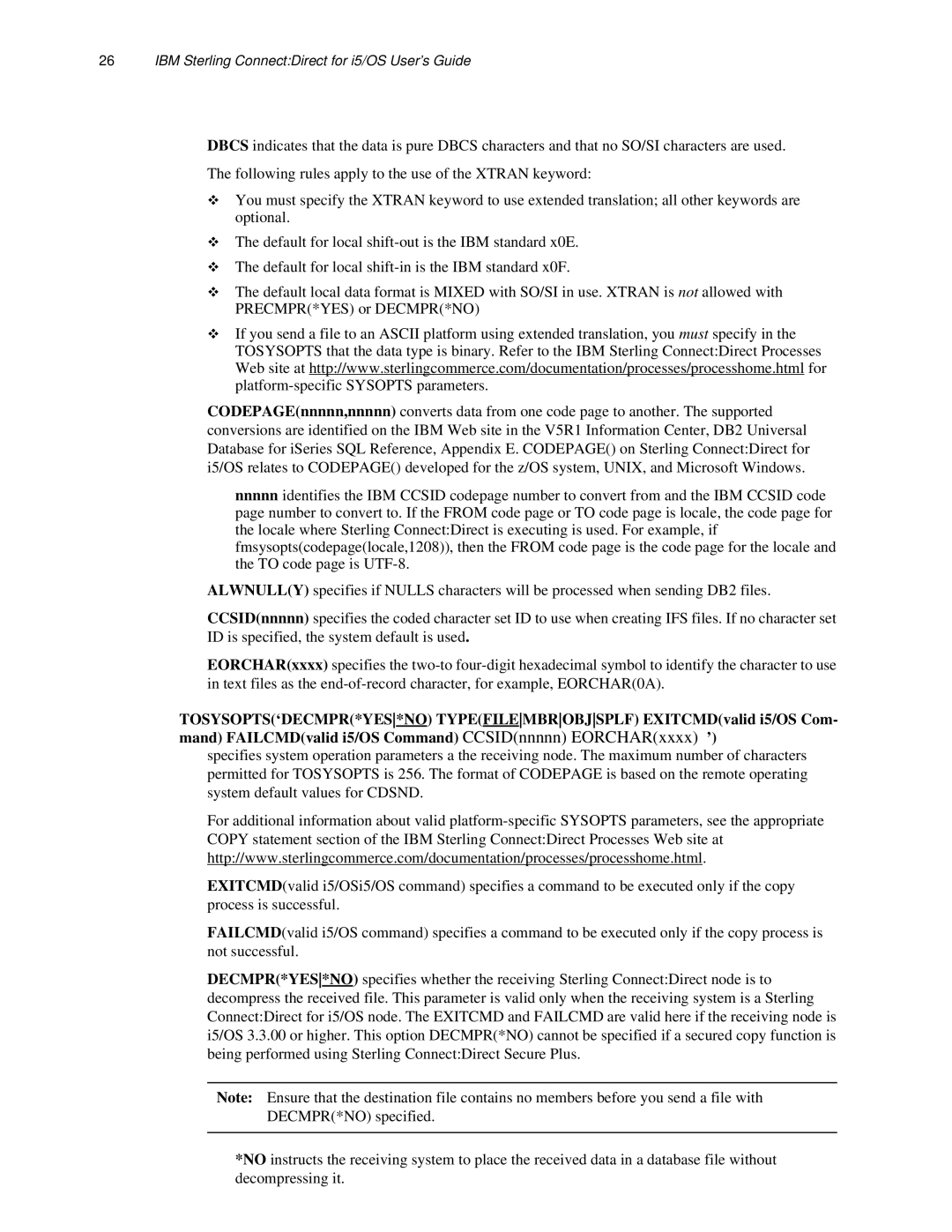26IBM Sterling Connect:Direct for i5/OS User’s Guide
DBCS indicates that the data is pure DBCS characters and that no SO/SI characters are used.
The following rules apply to the use of the XTRAN keyword:
You must specify the XTRAN keyword to use extended translation; all other keywords are optional.
The default for local
The default for local
The default local data format is MIXED with SO/SI in use. XTRAN is not allowed with PRECMPR(*YES) or DECMPR(*NO)
If you send a file to an ASCII platform using extended translation, you must specify in the TOSYSOPTS that the data type is binary. Refer to the IBM Sterling Connect:Direct Processes Web site at http://www.sterlingcommerce.com/documentation/processes/processhome.html for
CODEPAGE(nnnnn,nnnnn) converts data from one code page to another. The supported conversions are identified on the IBM Web site in the V5R1 Information Center, DB2 Universal Database for iSeries SQL Reference, Appendix E. CODEPAGE() on Sterling Connect:Direct for i5/OS relates to CODEPAGE() developed for the z/OS system, UNIX, and Microsoft Windows.
nnnnnidentifies the IBM CCSID codepage number to convert from and the IBM CCSID code page number to convert to. If the FROM code page or TO code page is locale, the code page for the locale where Sterling Connect:Direct is executing is used. For example, if fmsysopts(codepage(locale,1208)), then the FROM code page is the code page for the locale and the TO code page is
ALWNULL(Y) specifies if NULLS characters will be processed when sending DB2 files.
CCSID(nnnnn) specifies the coded character set ID to use when creating IFS files. If no character set ID is specified, the system default is used.
EORCHAR(xxxx) specifies the
TOSYSOPTS(‘DECMPR(*YES*NO) TYPE(FILEMBROBJSPLF) EXITCMD(valid i5/OS Com- mand) FAILCMD(valid i5/OS Command) CCSID(nnnnn) EORCHAR(xxxx) ’)
specifies system operation parameters a the receiving node. The maximum number of characters permitted for TOSYSOPTS is 256. The format of CODEPAGE is based on the remote operating system default values for CDSND.
For additional information about valid
EXITCMD(valid i5/OSi5/OS command) specifies a command to be executed only if the copy process is successful.
FAILCMD(valid i5/OS command) specifies a command to be executed only if the copy process is not successful.
DECMPR(*YES*NO) specifies whether the receiving Sterling Connect:Direct node is to decompress the received file. This parameter is valid only when the receiving system is a Sterling Connect:Direct for i5/OS node. The EXITCMD and FAILCMD are valid here if the receiving node is i5/OS 3.3.00 or higher. This option DECMPR(*NO) cannot be specified if a secured copy function is being performed using Sterling Connect:Direct Secure Plus.
Note: Ensure that the destination file contains no members before you send a file with
DECMPR(*NO) specified.
*NO instructs the receiving system to place the received data in a database file without decompressing it.
